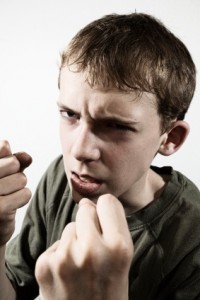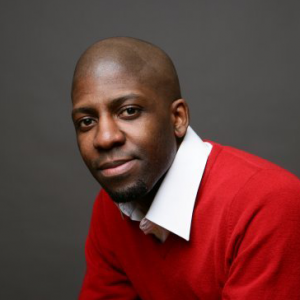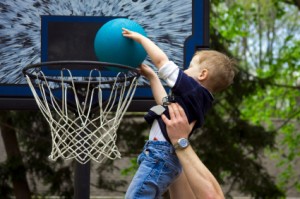|
|
October 14, 2010
 Who do you think you are? Great gobs of vitural ink have been sloshed around describing America’s “decline.” In a recent Newsweek story about the 100 best countries we didn’t even make the top 10. We’re Number 11. But, it’s not like Newsweek dropped a bombshell. We’ve all noticed the slippage for a while. From family problems to school problems to dysfunctional legislators to holy book burners.
Oh yes, my friends, we’ve got Trouble with a Capital T that rhymes with D and that spells DECLINE. All the pity party laments boil down to just one thing: “America’s lost its competitive edge.”
Oh yeah? Not so fast, dude. Sure, we may be losing the competition for top world ranking in stuff like education, health, quality of life, economics, and political environment. But what about Top Dog status in stuff that really matters? For example, when it comes to vying for popularity within their peer group no kids on Earth come close to the clawing, biting, sheer grit of American teens.
In light of recent horrific in-your-face school bullying plus the cyber predator stealth assaults launched from smart phones and PCs, I think I’ve figured out what’s driving at least part of it. It’s competition. And we’re scary good at it.
I’m sure we’d all agree that we hate bullying behavior. And it goes without saying we hate bullies. Every last one of them. But for the record, there is no them. It’s all us. From time to time, to one degree or another, consciously or un, we all dismiss other people as unworthy of respect. Folks, that’s the core of bullying. And we behave that way when we’re competing with each other.
Think about it. If you’re hotter (or cooler) than me or I’m hotter or cooler than you, we may distrust each other. We may try to bring each other down in thought, word or deed. If you’re smarter than me or way stupider, you’re on my hit list. If you’re fatter than me or thinner, if you wear more or less expensive clothes, if you’re a super jock or a super geek… watch out! ‘Cause whatever we are that’s “different” may be seen as a threat to someone else’s never-ending quest for votes, money, power, friends… love. And we all know what happens when we feel threatened. We attack. Sounds ruthless, but we’ve gotta get real. We’re on the edge here. Each one of us adults and kids, we’re socialized and primed to compete with each other and often that means giving each other a hard time.
So, you still in this competition or are you ready to opt out?
UPDATE: 2/2/12: Just got this great bullying awareness and prevention info-graphic from @MAT@USC aka, Master of Arts in Teaching… because it is an art!

October 2, 2010
Yesterday my friend Rachel wrote to find out if I’d blogged yet about the cyberbullying incident that ended in a Rutgers University freshman killing himself. I told her the news had really depressed me but that I didn’t have any insights that couldn’t be found elsewhere. I mean what do you say when (yet another) teen is so victimized by bullies he/she can’t figure out what the hell to do to make things OK again and gives up everything just to end the suffering? I’ve got nothing to say. I’m sitting here crying. The casualness with which these acts of torment are perpetrated absolutely stuns me. But what else is new?
So, no. I wasn’t going to write anything.
Then I watch Ellen Degeneres on video talking about this senseless act of cruelty. Looking straight at the camera and with obvious emotion Ellen said, “It’s hard enough being a teen and figuring out who you are without people attacking you.” To the adults watching she said, “There are messages everywhere that validate this kind of bullying and taunting and we have to make it stop.” And to the kids watching, she offered this, “…things will get easier. People’s minds will change and you should be alive to see it.”
Still I was not going to blog about what happened to Tyler Clementi and what he did as a result. Even though his death was the fourth in a string of Welcome Back-to-School homophobic attacks on teens that ended in suicide. It all sucks, but what more is there to say?
Then I listened to Justin Patchin of the Cyberbullying Research Center, a clearinghouse of information dedicated to providing information about “…the nature, extent, causes and consequences of cyberbullying amongst adolescents.” Patchin told NPR’s Melissa Block that when he speaks to teens who use their phones and computers to commit these acts of intentional cruelty they “genuinely do not realize that harm could come from it.” He went on to say that these kids “don’t see it as something wrong.” Rather, they think of what they’re doing as “fun or funny” and “not that big of a deal.”
That’s when I knew I needed to write. The tormentors don’t see it as something wrong?! For real?!! If that’s the case then we’re looking at a whole lot of broken kids. Broken in a way that prevents them from thinking beyond the itch of “Hey I got a great idea!” So broken they blithely launch a personally addressed cluster bomb packed with malice and truly believe it’s “not a big deal.”
With kids like that as our only hope for the future we ‘d be in deep doodoo.
Fortunately, these aren’t the only kids out there. There are plenty of kids and adults who aren’t buying into the notion that any of this is fun or funny. They’re deadly serious about fighting back, supporting each other and changing the Culture of Cruelty for any kid, tween or teen who’s catching flak for being different. GLBT teens, check out Dan Savage’s new “It Gets Better” project.
Oh, and by the way, October is National Bullying Prevention Month… Don’t just sit there, be part of the solution.
UPDATE: 6:49 PM Talk about cyber-bullying, just came back from The Social Network, a cautionary tale from the Real Friends vs. The Other Kind files. Totally worth seeing.
UPDATE: March 16, 2012 Today, a New Jersey jury found Dharun Ravi, Tyler Clementi’s former roommate guilty of bias intimidation among other charges.
UPDATE: May 21, 2012 Superior Court Judge Glen Berman handed down Dharun Ravi’s sentence: 30 days in jail and 3 years probation after having been found guilty of numerous crimes, including invasion of privacy and bias intimidation (a hate crime) http://video.msnbc.msn.com/nightly-news/47511677/#47511677

September 19, 2010
 David McQueen, The Dave Mack Project You don’t need me to tell you the road gets plenty rough during the teen years, for them and for us. 21st century parents frequently miss opportunities to take the lead and maintain meaningful connections with their tweens and teens. Of course, it’s not all our fault. Teens don’t encourage dialogue, at least not with us! But we can only change ourselves and we need to do a better job when it comes to really listening and trying to understand what’s going on with the young people we love most in the world. Because the lessons of intimacy we teach at home help our kids grow into adults with the confidence to discover who they ought to be.
When we miss those opportunities to connect, it’s not because we don’t care, it’s just that all of us (the kids too) are too busy to check in with each other. Sometimes reminders are needed.
My guest today is David McQueen and he’s here to provide some reminders. David is an educator, international speaker, and blogger extraordinaire. He empowers adults and youth alike on subjects such as leadership, careers and communication skills. Dave is also the founder of The Dave Mack Project, a teen empowerment movement that combines speaking, live events, social media and youth coaching for teens and those who work with teens.
For the last 22 years, Dave McQueen has reached over a million teenagers through live speaking and workshops, on TV and online, with messages of empowerment about inhabiting the present and creating a brilliant future.
Listen to our conversation right here:
[QUICKTIME http://www.anniefox.com/podcast/FC020.m4a 300 300 false true]
If you have iTunes, you can subscribe to this podcast in the iTunes Store.
Or, you can download an MP3 version here.
Upcoming guests include:
Ronit Baras, author of Be Special, Be Yourself for Teenagers
Sean Buvala, author of DaddyTeller: How to be a Hero to Your Kids and Teach Them What’s Really Important By Telling Them One Simple Story at a Time
Dr. Karyn Purvis, co-author (with Dr. David Cross, Wendy Lyons Sunshine) of The Connected Child: Bring hope and healing to your adoptive family
Judith Warner, author of Perfect Madness: Motherhood in the Age of Anxiety and We’ve Got Issues: Children and Parents in the Age of Medication
Katherine Ellison, author of the memoir, Buzz: A Year of Paying Attention

September 16, 2010
Most parents feel proud to see their kid being a good friend. But kids aren’t born knowing about respect, cooperation and empathy. They learn from us. And we teach our kids a whole lot about friendship by the way we help them and let them help us. Because of a parent’s consistent love and support little kids often say “My mom/dad is my best friend!”
 That's what friends are for. But as they grow, their friendships get more complex and our lessons need to be more pointed. We’ve got to help them connect the dots and understand that friendship is a two-way street.
If your son or daughter is being bullied or in any way getting the short end of the friendship stick, you can help. Since (s)he’s desperately trying to figure out what friendship is about, it’s a perfect time for a calm, respectful sit-down discussion. You might say something like this:
Sweetheart, in a real friendship (the only kind worth having) both people need to treat each other with respect. If a friend is sometimes nice and sometimes not, then respect yourself enough to stand up and speak the truth.
It isn’t always easy to tell the truth, even to a best friend. But if you stay silent things are probably going to get worse. Also, if you keep your mouth shut when you’re hurting, you let your friend believe that you’re OK with what’s going on. You and I both know you aren’t OK with being laughed at or teased or ignored, so why let anyone think that you are?!
In case you’re wondering if speaking up guarantees that you and your friend won’t ever have any more problems, the answer is no. In fact, if you tell your friend that you’ve had it with being disrespected, (s)he may get angry. (S)he may accuse you of trying to wreck the friendship. (S)he may turn others against you. (S)he may do all of that and more!
Because I’m always honest with you, I’m letting you know there are risks in telling the truth. But real friends can take the truth because they should know you’d never intentionally hurt them. And the truth often strengthens a real friendship, so there’s that.
Sweetie, I love you… which is why I want you to understand, now while you’re in middle school and for the rest of your life, that you’ve got to be your own best friend. That means letting people know where you stand and never giving anyone permission to be mean to you or others.
 — Older Posts »
| |














